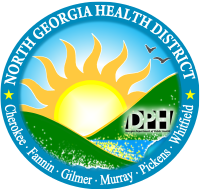Para leer este mensaje en Español, haga clic en 'Español' en la parte superior de esta página a la derecha
Woodstock, GA – Cherokee County Environmental Health officials advised that a raccoon attacked and bit a person on June 1st at River Chase Drive in Woodstock. The behavior of the raccoon indicated a strong probability it is rabid. The raccoon was neither captured nor killed, so residents are urged to take these necessary precautions:
- Avoid all contact with raccoons and other wild mammals. If you are bitten or scratched, seek medical attention as soon as possible. Rabies is usually fatal without preventive anti-rabies treatments.
- Children should be taught to avoid contact with wild mammals and to report any such contact to a parent or another adult who is in charge immediately. Remind children that wild animals are not pets and that wild mammals with rabies may sometimes appear tame and friendly, or they could appear sick.
- If bitten or scratched by a raccoon or other wild mammal, wash the wound immediately with soap and water for several minutes and then apply a skin disinfectant. Seek medical attention as soon as possible. Report the bite to Environmental Health at (770) 479-0444.
Cherokee County Environmental Health staff are canvassing the area with a printed advisory (please click the graphic) to ensure residents are aware of the incident and will watch for this raccoon and others that could potentially be rabies-infected.
Rabies is a fatal but preventable viral disease. It can spread to people and pets if they are bitten or scratched by a rabid animal. In the United States, rabies is mostly found in wild animals like bats, raccoons, skunks, and foxes. However, in many other countries, dogs still carry rabies, and most rabies deaths in people around the world are caused by dog bites.
The rabies virus infects the central nervous system. If a person does not receive the appropriate medical care after a potential rabies exposure, the virus can cause disease in the brain, ultimately resulting in death.
Rabies can be prevented by vaccinating pets, staying away from wildlife, and seeking medical care after potential exposures before symptoms start.
To learn more about rabies and how to prevent infection, log onto the CDC website at https://www.cdc.gov/rabies/index.html.













